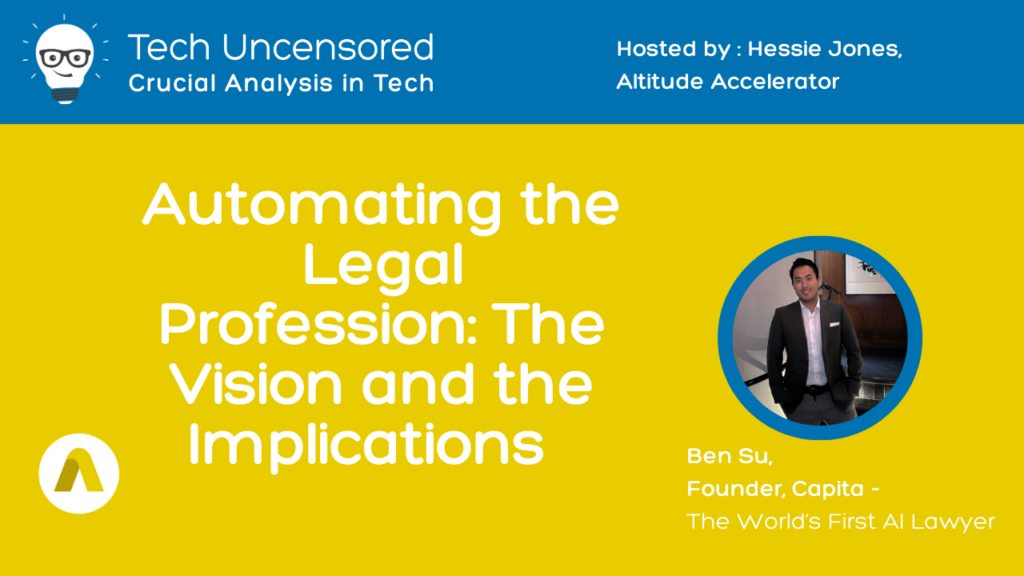Home » Transforming the Legal Field: Insights and Consequences of Automation
Transforming the Legal Field: Insights and Consequences of Automation

Summary of the Conversation between Ben Su and Hessie Jones
Ben Su, a lawyer with a diverse entrepreneurial background, shares his journey into the intersection of law and artificial intelligence (AI). His entrepreneurial spirit ignited in college when he realized the potential for business innovation while helping high school students as a tutor. This led him to co-found a biotech startup, generating significant insights into how legal frameworks underpin commercial endeavors, prompting his interest in law.
Su aimed to harness legal knowledge for entrepreneurial success rather than practicing law long-term. At the University of Ottawa, he concentrated on areas of law crucial for tech startups, such as intellectual property and corporate law. He realized the complexity of legal rules could be translated into "if A, then B" logic that software could potentially automate. By 2022, while working at a tech law firm in Toronto, he partnered with a law school classmate to launch "Capital," a venture designed to modernize the outdated legal service landscape.
Capital’s initial product automated elements of the startup fundraising process, facilitating access to legal services that many find prohibitively expensive. With support from notable investors and early traction, they pivoted towards creating a comprehensive solution to automate the entire legal stack for early-stage startups. Su underscores the discrepancies in legal service delivery, with many clients feeling anxiety over hourly rates and hidden legal costs.
He advocates for a shift in legal services from solely transactional interactions to becoming proactive thought partners for entrepreneurs. Many founders prefer guidance on strategic decisions rather than simply faster document processing. Su challenges the existing legal paradigm, where clients feel the need to minimize communication with lawyers due to cost concerns.
He argues that the legal profession currently fails to address the significant gaps in service affordability and accessibility. The model, which often preserves high fees despite increased automation capabilities in document processing, needs to innovate fundamentally rather than merely optimize. He believes that AI can act as a tool to level the playing field, offering valuable support to newer lawyers and solo practitioners who might lack the resources of established firms.
Su explains that using AI effectively involves a deep understanding of specific legal contexts rather than simply automating existing processes. He criticizes the reactive nature of traditional models, asserting that real value comes from guiding clients through their unique challenges rather than merely providing legal templates.
Looking to the future, Su predicts a transformation in legal education and practice, emphasizing the need for lawyers to embrace AI and serve as proactive partners to clients. He believes that a more democratized approach to legal services can unleash entrepreneurial potential and broaden access to necessary support. He acknowledges resistance to change within the profession but advocates for a shift that prioritizes client experience and aligns incentives more effectively with the needs of growing businesses.
Ultimately, Su’s vision calls for a redefined legal landscape where technology and empathy coexist, enhancing the practice of law while ensuring affordability and accessibility for all entrepreneurs. The conversation closes with a recognition of the evolving nature of both the legal profession and opportunities enabled by technological advancements.
Altitude Accelerator
https://altitudeaccelerator.ca/
Altitude Accelerator is a not-for-profit innovation hub and business incubator for Brampton, Mississauga, Caledon, and other communities in Southern Ontario. Altitude Accelerators’ focus is to be a dynamic catalyst for tech companies. We help our companies grow faster and stronger. Our strength is our proven ability to foster growth for companies in Advanced Manufacturing, Internet of Things, Hardware & Software, Cleantech and Life Sciences. Our team consists of more than 100 expert advisors, industry, academic, government partners. The team helps companies in Advanced Manufacturing, Internet of Things, Hardware & Software, Cleantech and Life Sciences to commercialize their products and get them to market faster.


